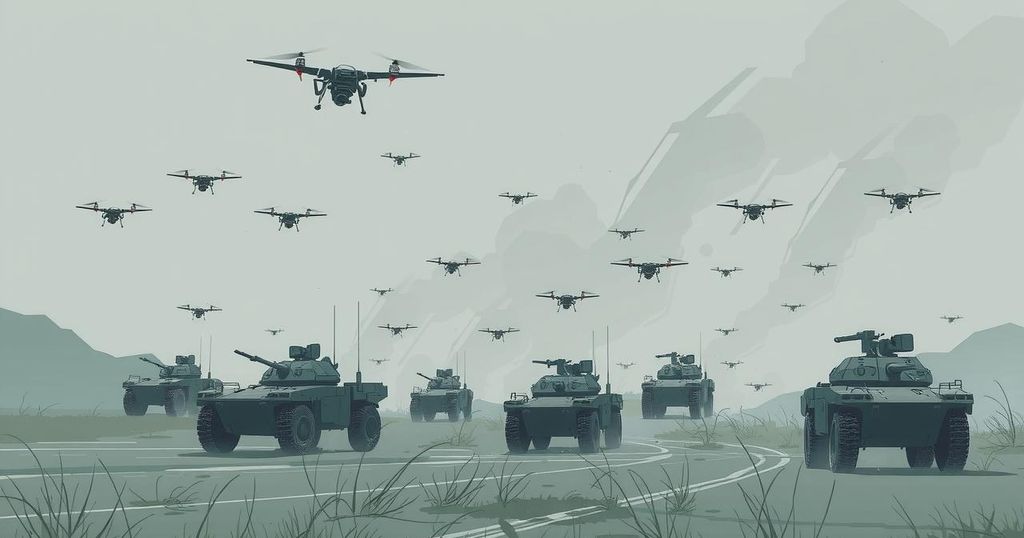North Korea Augments Support for Russia in Ukraine Conflict

North Korea has sent approximately 3,000 additional soldiers to support Russia’s war in Ukraine, contributing to a total of 11,000 troops. The reinforcement aids Moscow’s ongoing military efforts while North Korea supplies various military equipment. As negotiations for a ceasefire continue, the deepening military ties between North Korea and Russia raise concerns regarding regional stability and the potential for technology transfers.
North Korea has reportedly sent an additional 3,000 soldiers to support Russia’s military efforts in Ukraine, as stated by South Korea’s military. This contingent reinforces the approximately 11,000 troops previously dispatched by North Korea, with the latest reinforcements sent in January and February. Unfortunately, around 4,000 of these troops are reported to have sustained injuries or fatalities in combat.
In addition to personnel, North Korea has provided a noteworthy supply of military equipment to Russia, including a “significant amount” of short-range ballistic missiles, over 220 self-propelled howitzers, and multiple rocket launchers. South Korean officials anticipate that North Korea’s military contributions might increase further as the situation evolves.
This update arrives as European leaders gather in Paris to discuss ongoing support for Ukraine, alongside efforts by the White House to initiate a ceasefire. Recent discussions in Saudi Arabia led to a consensus between Russia and Ukraine on pausing contentious activities in the Black Sea, although Russia has set high demands for partial agreement implementation, underscoring disparities in negotiations.
North Korean leader Kim Jong Un and Russian President Vladimir Putin have solidified military cooperation since signing a defense pact last year, pledging mutual assistance in military aggressions. Notably, Russia’s security adviser Sergei Shoigu recently visited North Korea, expressing Putin’s commitment to their agreements.
The United States has raised concerns that Russia may soon extend advanced satellite technology to North Korea in exchange for military support regarding the ongoing conflict in Ukraine. North Korean forces initially engaged in the Russian Kursk area, but they retreated following high casualties, with reports indicating around 400 soldiers lost and 3,600 injured as of late February.
North Korea has been responsible for shipping significant amounts of ammunition and related materials to Russia, while Russian forces have utilized North Korean missiles in their Ukraine operations. Moreover, North Korean medical facilities have reportedly treated numerous Russian military personnel injured in the ongoing conflict, with reciprocal arrangements involving resource sharing.
Recent developments reveal North Korea’s military advancements, as Kim Jong Un oversaw the testing of AI-powered drones, which are anticipated to enhance their warfare capabilities. Furthermore, North Korea reportedly unveiled a new reconnaissance drone potentially derived from Russian technology. Drones have become pivotal in the conflict, with a substantial increase in Russian drone operations noted.
As both countries pursue military objectives, they remain entrenched in ongoing hostilities, with recent drone strikes in Ukraine causing civilian casualties and infrastructure damage. Ukrainian President Volodymyr Zelensky remarked on the dire circumstances, emphasizing that no nation should endure such turmoil.
In summary, North Korea’s recent deployment of additional troops and military support to Russia exemplifies their resolve to bolster Moscow’s operations in Ukraine. The evolving military partnership includes significant extra shipments of weapons and joint advancements in military technology. This collaboration reflects not only a commitment to mutual defense but also highlights ongoing geopolitical tensions and the complexities surrounding ceasefire negotiations. As the conflict continues, both nations are likely to deepen their military engagement, raising significant concerns for regional and global stability.
Original Source: www.cnn.com







